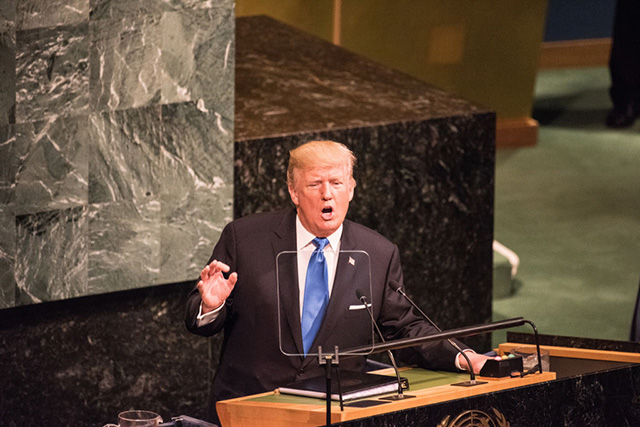
President Donald Trump raised the possibility of launching high-stakes US military operations in three corners of the world on Tuesday, at his first address to the United Nations General Assembly.
The president targeted North Korea, Iran and Venezuela–which he termed as “rogue regimes,” from the UN podium, in a speech reminiscent of George W. Bush’s pre-Iraq War “Axis of Evil” State of the Union.
Trump’s harshest rhetoric was reserved for North Korean leader Kim Jong Un.
“The United States has great strength and patience, but if it is forced to defend itself or its allies, we will have no choice but to totally destroy North Korea,” he said.
Pyongyang has recently conducted intercontinental ballistic missile tests over Japan, including one last week. On September 3, the North Korean military also conducted a hydrogen bomb test. The United Nations Security Council responded by voting to impose harsh economic sanctions on North Korea.
South Korean officials have reacted to the tests by outlining an “aggressive response,” if Pyongyang is preparing a “missile or nuclear” attack on Seoul.
While the plan would target “North Korean leadership,” it makes no invocation of the sort of wholesale destruction promised by Trump on Tuesday. Last month, Trump responded to North Korean missile tests by promising “fire and fury like the world has never seen.”
In ongoing wars, the current administration has already shown lesser consideration for human life abroad. Observers claim that civilian casualties have increased manifold in US counter-Islamic State (ISIL) operations since Trump became Commander-in-Chief.
Later in Tuesday’s speech, Trump also raised the prospect of a second nuclear conflict — between the US and Iran.
“The Iran Deal was one of the worst and most one-sided transactions the United States has ever entered into,” he said, referring to the 2015 agreement between Iran, the US, Germany and permanent UN Security Council members. The accord lifted multilateral sanctions in exchange for international oversight of Iranian civilian nuclear technology.
“Frankly that deal is an embarrassment to the United States, and I don’t think you’ve heard the last of it. Believe me,” Trump added.
He also invoked humanitarian concerns about the Iranian government, mimicking Bush administration rhetoric about Saddam Hussein in the run-up to the invasion of Iraq.
“The longest suffering victims of Iran’s leaders are, in fact, its own people,” Trump said.
The president also attacked Iranian support of Hezbollah — despite US allies’ alleged backing of militant Sunni groups.
In May, at a counterterror summit in Saudi Arabia, Trump urged leaders of Muslim majority nations to “drive out the terrorists and drive out the extremists.” Weeks later, the region spiraled into a diplomatic crisis, after the governments of Saudi Arabia, the United Arab Emirates and Egypt led an effort to accuse Qatar of supporting terrorism.
“The amount of support for terrorism by Saudi Arabia dwarfs what Qatar is doing,” said Senate Foreign Relations Committee chair Bob Corker (R-Tenn.) in July, reacting to the crisis.
On Tuesday, President Trump also singled out the Venezuelan government for criticism, attacking the “socialist Maduro regime” amid a political and economic crisis in the South American country.
“This situation is completely unacceptable, and we cannot stand by and watch,” Trump claimed. He also said the US should “help them regain their freedom, recover their country and restore their democracy.”
Venezuela has been gripped by an economic crisis since 2014, after attempting to implement fixed exchange rate policies and after the fall of oil prices reversed gains made by social programs implemented by Hugo Chavez.
Protests against Venezuelan President Nicolas Maduro this year have been met with fatal police violence, in some instances, but demonstrators themselves have been militant and are accused of killing scores of people.
“The problem in Venezuela is not that socialism has been poorly implemented, but that socialism has been faithfully implemented,” Trump said, as many attendees laughed and murmured, to a smattering of faint applause.
The last time a Republican president was in power, the United States cheered on a coup d’etat against a Venezuelan socialist leader — Chavez, in 2002.
Bush administration officials knew about the plot beforehand, and blamed Chavez just hours after. Two of the coup’s leaders — Army Commander in Chief Efrain Vasquez and General Ramirez Poveda — had received training at the US military’s infamous School of the Americas in Ft. Benning, Ga.
Thank you for reading Truthout. Before you leave, we must appeal for your support.
Truthout is unlike most news publications; we’re nonprofit, independent, and free of corporate funding. Because of this, we can publish the boldly honest journalism you see from us – stories about and by grassroots activists, reports from the frontlines of social movements, and unapologetic critiques of the systemic forces that shape all of our lives.
Monied interests prevent other publications from confronting the worst injustices in our world. But Truthout remains a haven for transformative journalism in pursuit of justice.
We simply cannot do this without support from our readers. At this time, we’re appealing to add 50 monthly donors in the next 2 days. If you can, please make a tax-deductible one-time or monthly gift today.